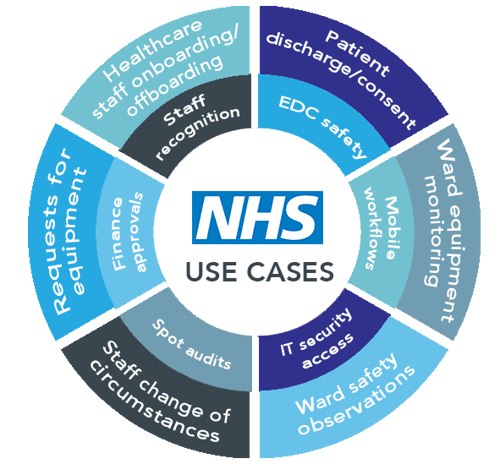As Heraclitus says the only constant in life is change and we have seen lots of that in government and healthcare circles over the last 12 months.
Roll back to November 2021, Sajid Javid, the then Secretary of State for Health and Social Care, announced he had accepted recommendations to merge NHSX and NHS digital into NHS England (NHSE). The idea behind this move was to create a single statutory body responsible for data and digital technology.
Over the course of the past twelve months, we have seen NHSX absorbed into the new Transformation Directorate of NHSE and expected NHS Digital to transition over by March 2023. Recent announcements from The Department of Health and Social Care (DHSC) indicate that these plans have been accelerated so that the merger will take place in January 2023 meaning that NHS Digital will no longer exist as an arms-length body of the DHSC.
Change Implications for NHS Digital Staff
This latest announcement will inevitably have implications for NHS Digital personnel. Indications suggest that staff and assets will transfer to NHSE before a wider change programme ensues.
It is important that this merger, and all this change, does not negatively impact the stellar work to drive unprecedented digital transformation through technology during the pandemic. It’s clear that digital transformation in healthcare continues to be a key priority and the right mix of personnel and skills will be imperative to continue and improve this momentum.
Why Is Digitisation Within the NHS Still an Issue?
As the need for digital transformation within the NHS persists the pain points/obstacles to accelerated digitisation still prevail:
- Healthcare work continues to be inhibited by manual processes
- A lack of IT resources (financial and human) to build, manage and maintain digitised processes
- Heritage legacy systems that are slow/lack the functionality required for true workflow automation or agile change
- End users (healthcare staff including clinicians) not having fast access to patient data
- Gap in what senior management think end users need vs. the systems purchased to solve the problem
- A fear of doing things differently from how they have been done in the past
- A misconception that digital projects require huge resources to get off the ground
Many legacy systems within the NHS, with a workflow component, are 100% reliant on IT departments. The systems require personnel with coding experience to apply the logic required for process automation.
Coding can take time and each coder may approach a project differently so consistency issues and documentation can be problematic further down the line if there is a job role change.
Maintenance then also comes into play, inevitably there will be changes required to processes/workflows, so the task falls to IT again to tweak the logic to suit a change in requirement. It's clear to see that this is a mammoth task for hospitals and trusts when you consider how many processes need to be digitised.
Process Automation for Optimal Workflow Within the NHS
Process or workflow automation within the NHS is a necessity now more than ever to assist with fast decision-making, accurate data and reporting, and identifying bottlenecks in workflow quickly. Process automation not only assists with backend processes such as onboarding and offboarding of staff but also in patient-facing scenarios when a clinician or radiographer for example needs to update notes before a patient is discharged or transferred back to a ward.
Automating mandatory processes ensures better backend and patient-facing processes and helps to free up healthcare staff.
Other time-intensive processes such as medical equipment requests, provisioning and system access (PASA), and ward incident reporting which historically have been (and in some instances still are), paper-based are strong use cases for digitisation, streamlining mandatory processes and ensuring fast, accurate, collection of information which is routed to the correct person/department to action.
The Benefits of No Code Process Automation in the NHS
It’s clear that leaning on IT departments is no longer feasible for accelerated digitisation. No code tools are available which empower end users/process owners to create, manage and maintain their workflows. Process owners can quickly build simple and complex processes with minimal IT involvement.
“Who is better to create solutions than the people who work in the NHS every day and see where the problems are?”
said former NHS Innovation Accelerator (NIA) interim deputy director Maria Kyriacou.
“These innovations show that the NHS and the people who work in it are doing everything they can to help the nation’s health.”
The IT departments can still govern the digitisation of processes but the level of involvement is substantially reduced easing pressure on the IT department and accelerating digitisation where it will have a significant impact.
The need to digitise processes is becoming more of a priority to ensure that Hospitals and Trusts can work efficiently, report accurately, and make decisions confidently all while maintaining the highest standard of care for patients. Some of the main reasons that the NHS choose the FlowForma Process Automation tool include:
- FlowForma is on the London Procurement Partnership (LPP) framework for the provision of its Process Automation Tool
- FlowForma is an approved vendor for workflow automation on NHS shared tenancy 'N365'
- It empowers business people/process owners to build their own processes
- It follows LEAN principles
- It provides complete process visibility and highlights bottlenecks
- It enables cross-departmental knowledge sharing
- It is a fully customisable, no-code, logic only tool
- It is a 3-in-1 toolkit, with forms, workflow, and document generation
- It is a cost-effective solution
- Its intuitive user interface encourages adoption
- It provides better reporting
- Processes can be digitised within hours and weeks
With these accelerated digitisation plans, rising service demands, and tightened finances now is the time to work in a different, smarter way by empowering process owners and removing the bottleneck within IT departments.
If you are interested in understanding how your Hospital or Trust can accelerate digitisation take a look at the various resources on our Improving Patient Care in NHS Hospitals and Trusts section on our website or schedule a digitisation clinic, designed to help you understand where to start.
.png) By
By 




